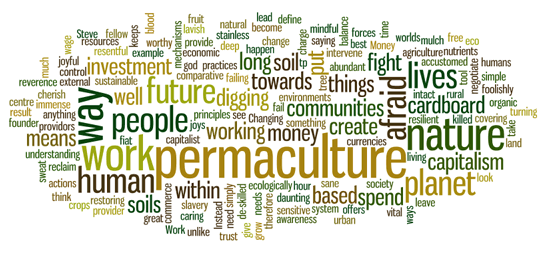I decided to call this post occupy permaculture after coming across a short video of the same name, the video in question is a recording of Bill Mollison the founder of Permaculture, addressing his students before the start of Permaculture design course. Mollison tells his students ‘we can run away to the bush, build a mud hut and grow ducks in the garden, it’s not gonna do it. The coals will still be burnt, the land will still be eroded, and the forests will still be cleared for newsprint if we run away to the bush. So, there’s no escape, we’ve just gotta stop running away, stay where we are and start to face up and fight’ after this Mollison says as long you all understand that we can start the course.
Facing up and fighting
There are millions of people in every corner of the globe who are acting on climate change and moving away from the mindless unsustainable consumption of Consumerism and it’s locked in Labour where people’s lives and time are eaten by endless toil. There is now mass civil unrest gathering momentum in Europe, the wealthy West and its technocratic Neoliberal leaders are engaging in wrecking local economies and cutting our social support structures to the bone, before these services are tendered out to the supporters and sponsors of our political leaders. There is no greater time in our economic and political history where there is not only a real need to replace what we have, but also that we can replace it with something that is long lasting and in harmony with the rest of the planet that exists outside of our human world.
Time to move on
There is also strong evidence to suggest that parties who are social democrats and left in their political leanings have sold out to the Free Market ideal, and cannot be trusted to bring about the huge transitional change needed if there is going to be any future at all. For many, this infestation of Free Market Neoliberal ideas which has seeped into mainstream politics it too much, why vote for a mainstream party when they all Neoliberal and will all carry on with business as usual instead of addressing the real and urgent issues that we face? 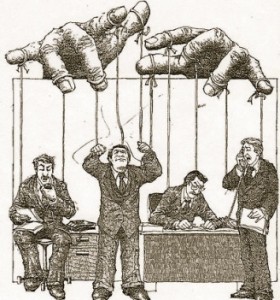
Self governance: communities coming together
In Europe and the US the idea of voting as a means of political change is dying on its feet, people are taking action themselves and in their communities and are telling new stories and writing the future with new ways of thinking and innovating as they try out, experiment and tinker their way towards a sustainable future. This movement is rapidly coming together as a force with ecologically sensitive communities who generate their own resources popping up all over the place. Along with this new found self reliance, there is also a self reliance in governance and administration happening within these communities, and within urban communities where there is a strong current of alternative thinking. 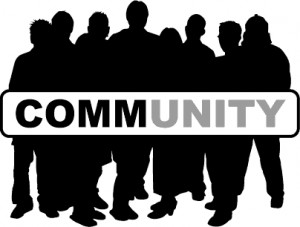
A storehouse of ideas
As a growing movement, unless we are curtailed or stamped out completely by the Fascist Neoliberal’s and their advance into our lives and resources, the new thinking of a fair and ecologically sound future is more likely to come from a combination of philosophies and ideas from the Anarchist schools of thought, from the principles and ethics of permaculture, and from the organizational practices of cooperatives and mutual associations as opposed to the competitive mindset that has been imposed on us for the last during the last century.
Learning and connecting
To follow Bill Mollison’s line on not running off the sticks with your seeds and acres of land, it would seem that the best place to begin is with the people around us. There is a huge potential for urban communities to develop networks of skills and resources sharing within their local areas. People are more relaxed within community settings, so when someone passes on a new skill to another person it has an entirely different meaning than something that was carried between by two salaried employees, it has meaning, particularly if is something that can be applied in a direct way where the results are clearly visible.
Community building for a fairer future 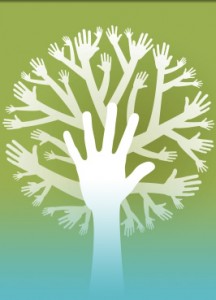
Community building can take place in a number of settings, statutory departments and the voluntary sector have some limited input into community development within a societal context, but it is what happens naturally between the community members themselves that is the driving force of successful resilient communities. Those of us who have skills and knowledge in permaculture should really show as many people these skills as we can, and try and promote these skills within the areas in which we live, in some ways this represents how we work within the people care ethic, we should give of ourselves and help others who need what we are able to offer them, people remember this and at some point in the future will probably help you with something that you need.
Community building checklist
- Say hello to your neighbours
- Invite people in for a cup of tea and a chat
- Share skills with you neighbours and local community members
- Have regular social gatherings in yours and other peoples gardens where neighbours bring some food to be cooked and eaten collectively.
- Look out for each other
- Respect peoples ideas and inputs and offer help to fulfill and bring ideas into fruition
Community action planning
Community development within an era in extreme individualism is no easy task, however there are the basic human requirements for existence that are a powerful way of bringing people together, our garden at home not only provides us with cleanly grown healthy natural food, but it also serves as a useful propaganda tool to spread the word of growing your own resources at home and how it can be achieved on a budget within a heavily populated urban environment. As the Big food companies that dominate and control our food supply sell us an idyllic rustically packaged slice of industrial food through clever advertising, permaculture will sell you the tools you need to create a resilient abundance free of charge, and not only that we will come round to your house to help you achieve it.
Selfless help
I really believe that Anyone who has undertaken permaculture training should pass on as much of their knowledge as possible, such knowledge needs to become common and needs to proliferate far and wide. Having such dynamic and workable knowledge as permaculture in our times, and not sharing and passing on that knowledge is nothing short of criminal, lets get it out there, onto the Council estates and projects and lets give people a fighting chance to create a worthwhile future. For me there is very selfless element within permaculture that reclaims the idea of human being cooperative as opposed to the idea that we are all naturally selfish individuals, when I received my PDC certificate from Patrick Whitefield at Ragmans lane Farm, I found it completely humbling and it actually meant a lot more to me, and was more useful than any of the academic qualifications that I have.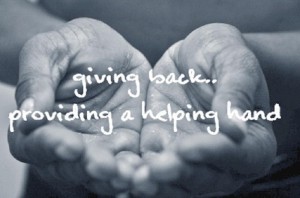
Community seed banks
Setting up a community seed bank is not difficult, neither is saving seeds from your heirloom crops. The beauty of saving and distributing seeds within a community setting means that we as community members have access to a valuable seeds supply that is generated by the community, within the community, it also provides a great deal of independence and removes us from the scenario of controlled seed stock by Market forces and biotech companies.
Living in a Permanent culture
The potential for permaculture as both an emancipatory force and a tool to create ecologically sensitive communities where well being for all is at the centre of its ideas and practices is immense. Reliance on external market based providers is both divisive and will ultimately lead us to a long and grinding form of wage slavery, which we are already accustomed to within modern capitalist society. Living in a permanent culture means that our daily work and actions are guided by permaculture ethics and principles as we strive to create and restore a balance and awareness of nature and each other, that has been lost through capitalism and its comparative anti-community nature.
Work as means of restoring the biosphere
Far from this way of living being rooted in toil and blood sweat and tears, permaculture offers us ways of working in a sane and thoughtful way, as we negotiate our way into the future. A very simple example of this is, instead of spending a whole digging up and turning over the soil to grow your veggies in, simply spend an hour covering the ground with a cardboard mulch and some organic matter and plant your crops through the cardboard. This method unlike that of digging keeps all of the soils vital nutrients intact with the soils structure and adds to the fertility of the land.
 Money is not our god!
Money is not our god!
As Freeconomy founder Mark Boyle once put it, nature does not ask us for credit cards when we take fruit from a tree. Nature will give us all we need, free of charge, in return we should be mindful and caring towards that which sustains and nourishes us and therefore cherish and look after nature to the best of our abilities. The long hours we spend working as a result of the control mechanisms of capitalism, leave us little time to do the things that are really human, the things that define us. The great stainless steel provider of industry and commerce that controls our resources has de-skilled us, and removed us from the deep and satisfying joys of what it is to be a human being in their natural environment. Our work as humans should be joyful, it shouldn’t be something that loathe and become resentful towards. Our future investment should be an investment of cooperation, trust and understanding with our fellow human beings, and not a pile of paper money which we foolishly lavish with the reverence of status and kudos.
Don’t be afraid
Changing anything in our lives can sometimes be daunting, but when the change can have such a profound and positive impact on our lives then it worth doing. I put it to people not to be afraid of the fight for the future that we would all like to see, as the old saying goes ‘We are many and they are few’ is worthy of consideration when we think that we have doubts about this fight. I am actually more afraid of what will happen to the planet and its inhabitants if we fail to intervene and reclaim our lives and communities from the forces that have manufactured this separation. Industrial agriculture has killed much of the worlds soil and is failing to provide for our needs in a sustainable way, permaculture can do this by generating resilient and abundant eco systems within both rural and urban environments. Our fiat money based economic system has failed to work for people and planet, permaculture encourages local currencies, bartering, and mutual associations that work for people and planet.
Steve

